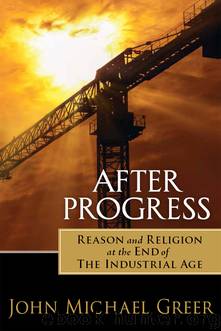After Progress: Reason and Religion at the End of the Industrial Age by John Michael Greer

Author:John Michael Greer [Greer, John Michael]
Format: epub
ISBN: 9781550925869
Publisher: Perseus Books, LLC
Other examples could be multiplied endlessly, starting with the wholly fictitious flat-earth beliefs that modern writers insist on attributing to the people who doubted Columbus,9 but these will do for the moment, not least because one of the authors I’ve cited was one of the twentieth century’s most thoughtful evolutionary biologists and the other was one of the twentieth century’s most thoughtful Christians. The point I want to make is that the conventional modern view of the history of human thought is a fiction, a morality play that has nothing to do with the facts of the past and everything to do with justifying the distribution of influence, wealth and intellectual authority in today’s industrial world. That’s relevant here because the divide sketched out a few paragraphs ago — the supposedly irreconcilable struggles between a way of knowing the world that’s realistic, progressive and true, and a received wisdom that’s sentimental, nostalgic and false — is modeled on the narrative we’ve just been examining and has no more to do with the facts on the ground than the narrative does.
The great difference between the two is that neither medieval cosmographers nor late eighteenth-century geologists had the least notion that they were supposed to act out a morality play for the benefit of viewers in the early twenty-first century. Here in the early twenty-first century, by contrast, a culture that’s made the morality play in question the center of its collective identity for more than 300 years is very good at encouraging people to act out their assigned roles in the play, even when doing so flies in the face of their own interests.
Christian churches gain nothing by accepting the loser’s role in the ongoing squabble over evolution. The huge amounts of time, effort and money that have gone into the creationist crusade could have been applied to something relevant to the historic creeds and commitments of the Christian religion, rather than serving to advance the agenda of their enemies. That this never seems to occur to them is a measure of the power of the myth.
Those of my readers who have an emotional investment in the environmental movement might not want to get too smug about the mistakes of the creationists, mind you, because their own movement has been drawn into filling the same role with equally disastrous consequences. It’s not just that the media consistently likes to portray environmentalism as a sentimental, nostalgic movement with its eyes fixed on an idealized prehuman or pretechnological past, though of course that’s generally true. It’s that a great many of the public spokespersons for environmental causes also speak in the same terms, either raging against the implacable advance of progress or pleading for one or another compromise in which a few scraps are tossed nature’s way as the engines of progress go rumbling on.
According to the myth of progress, those are the sort of speeches that are assigned to the people on history’s losing side, and environmentalists in recent decades have done a really impressive job of conforming to the requirements of their assigned role.
Download
This site does not store any files on its server. We only index and link to content provided by other sites. Please contact the content providers to delete copyright contents if any and email us, we'll remove relevant links or contents immediately.
The Lost Art of Listening by Michael P. Nichols(7494)
Why I Am Not A Calvinist by Dr. Peter S. Ruckman(4148)
The Rosicrucians by Christopher McIntosh(3510)
Wicca: a guide for the solitary practitioner by Scott Cunningham(3167)
Signature in the Cell: DNA and the Evidence for Intelligent Design by Stephen C. Meyer(3130)
Real Sex by Lauren F. Winner(3014)
The Holy Spirit by Billy Graham(2944)
To Light a Sacred Flame by Silver RavenWolf(2814)
The End of Faith by Sam Harris(2733)
The Gnostic Gospels by Pagels Elaine(2527)
Waking Up by Sam Harris(2454)
Nine Parts of Desire by Geraldine Brooks(2360)
Jesus by Paul Johnson(2352)
Devil, The by Almond Philip C(2324)
The God delusion by Richard Dawkins(2305)
Heavens on Earth by Michael Shermer(2278)
Kundalini by Gopi Krishna(2180)
Chosen by God by R. C. Sproul(2161)
The Nature of Consciousness by Rupert Spira(2104)
